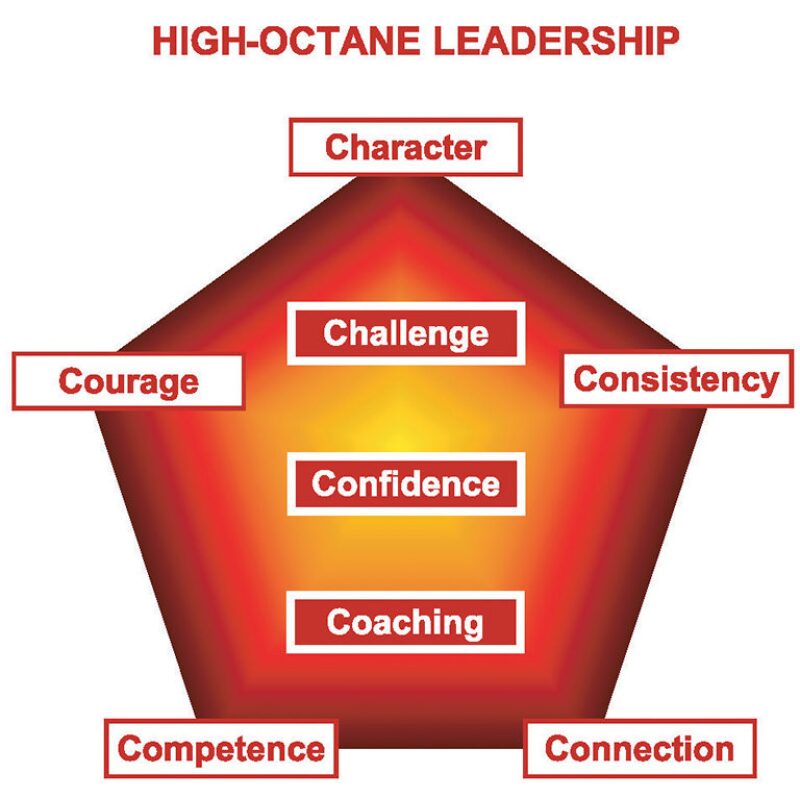For this issue, we have PerSPEctives from Carole Nakhle and John MacArthur. In her article, Nakhle discusses attracting talent to the oil industry to ensure that future human resource requirements are met. In addition to improving the image of the oil and gas industry among students, part of the equation is to ensure that women are equally drawn into the industry. MacArthur shares his thoughts on leadership. Recognizing that young leaders will be key to the survival of the industry, he presents a model of high-octane leadership that provides several tips on becoming a good leader. Remember that building leadership skills is crucially important in your career, so you should start early. So read on!
Léon Beugelsdijk, TWA PerSPEctive Editor

Humanity has always faced tough challenges. These challenges remain daunting. According to Jessica Williams’ book 50 Facts That Should Change the World, one in five people in the world live on less than U.S. $1 per day and about the same proportion, some 800 million people, go hungry daily. Williams explains that in recent years, a third of the world’s population has been at war, with a quarter of all armed conflicts involving a struggle for natural resources such as oil, minerals, metals, water, timber, and drug crops. The good news is that our industry can help tackle these problems; a secure supply of energy is critical to peaceful economic growth and a stable development environment.
Global energy demand grew by more than 4% last year, exceeding 10 billion tons of oil equivalent (approximately 73 billion bbl) for the first time, and according to Intl. Energy Agency (IEA) projections, this could increase by more than half over the next quarter century. We will still rely on hydrocarbons, with 60% of demand to be met by oil and gas by 2030.
IEA believes that this projected growth in energy demand will require massive investment—more than U.S. $16 trillion by 2030, to unlock supplies and build energy infrastructure. A recent industry survey showed E&P capital investment rising to nearly U.S. $200 billion in 2005, with more than half of those surveyed expecting their spending to increase by a further 10% in 2006. To put these sums into context, consider the depressing comparison that the world’s trade in illegal drugs is estimated to be worth around $400 billion, which, ironically, is the same as the world’s legal pharmaceutical industry, and also around the amount that the United States will spend on its military this year. If we instead find ways to invest more in a secure energy supply and new resources, we will be investing in economic prosperity for more people around the world, reducing global poverty and war.
Young Professionals Leading the Way
Meeting the world’s energy needs in the coming years will require today’s younger generation of E&P professionals to develop a combination of leadership skills, together with the ability to roll up their sleeves to get things done, inspiring people to achieve a common goal, and acting as good followers when necessary. Future leaders will need outstanding leadership skills to navigate through jungles of uncertainty. Stephen Covey accurately describes the role of the leader in his book The 7 Habits of Highly Effective People. He explains, “A leader is the one who climbs the tallest tree, surveys the entire situation, and yells, ‘Wrong jungle!’” Managers perform a vital role working with systems, processes, and tasks. Managers move into the realm of leadership when they work with people and their emotions. Strong leadership will be particularly important in uncertain times when change will be dramatic and major strategic shifts may be required. People will have to be persuaded to follow a new path.
Young professionals should not wait until they are running their organizations to act as leaders. A common misunderstanding is that leadership is positional or hierarchy-based. Command is not leadership, because some commanders may be unfit to lead. However, many commanders are also good leaders, and, while it is important to be able to challenge poor decisions from unfit commanders for the greater good of the organization, we must aim to not disrupt the chain of command without good reason. Too many organizational command structures focus on conserving existing enterprise momentum rather than determining if a new direction is needed. Young leaders will play an important role in challenging the status quo where it is constraining opportunity, and in exploring new directions. They will also have a duty to be good followers, learners, and listeners, and to support other leaders in delivering organizational goals.
Everyone Has Leadership Potential
Another misunderstanding is that leaders need to be charismatic, or the biggest, or the fastest, or born with some natural gift. Each of us has leadership potential, albeit in varying degrees. We cannot all be Mao Zedong or Mahatma Gandhi. But Napoleon Bonaparte maintained, “Every French soldier carries a marshal’s baton in his knapsack.” History has shown that many leaders were made by circumstance, not by birth or genetics.
Youth need not be a barrier. John D. Rockefeller was only 26 years old when he took control of Standard Oil in 1865. Alexander the Great led the Macedonians against Darius III, King of Persia, when he was only 22 years old. As King of Macedon, Alexander’s position gave him authority, but his excellence in leadership is legendary. His army followed him from Greece to India, founding 18 new cities, and creating a vast empire of more than two million square miles.
Alexander courageously led from the front at Issus against a foe four times the size of his own army, even after he was wounded. After the battle, and despite his own wounds, Alexander went round all the other wounded and thanked them; he had a word of congratulation for each of those who had fought bravely, and honored them with gifts. In his book Alexander the Great, Robin Lane Fox concludes, “This is the way to lead one’s men.”
So if leadership is not about status, innate genius, or age, what is it about? Leadership is ultimately about influence. It is about having the qualities that cause people to follow you, and the ability to inspire those people to do more than they thought they were capable of doing. Alexander certainly inspired his men. In our industry, we can draw learning from a rich reservoir of leadership history, from buccaneering industry leaders like John D. Rockefeller, Marcus Samuel, Henri Deterding, and Calouste Gulbenkian, to visionary political leaders like King Ibn Saud and Juan Pablo Pérez Alfonzo. Recommended reading for those who wish to explore our industry’s history is Daniel Yergin’s The Prize: The Epic Quest for Oil, Money, and Power.
High-Octane Leadership
The chemists among you will know that octane is structurally C8H18, and that the octane rating is a scale for premature detonation or antiknocking in spark-ignition internal-combustion engines. Higher octane ratings correlate to higher activation energies and more-powerful engines. To help frame thoughts on leadership, I have compiled my own “high-octane leadership C8.” These eight Cs are: Challenge, Confidence, Coaching, Competence, Connection, Character, Consistency, and Courage. Each element describes an aspect of leadership and also serves as a guide to being a good follower as well as a good leader. I was once told by a senior industry figure that in his early career he learned first to be a good follower and that through this he developed the understanding of leadership skills he needed later in his career.
The first three Cs describe how a leader inspires and interacts with people. They are: Challenge, Confidence, and Coaching and are derived from Paul Thornton’s leadership model, introduced in his book Be the Leader, Make the Difference.
1. A leader must challenge people to achieve beyond their expectations and assumptions by setting targets and using external benchmarks as a continuous driver to improve.
2. Although leaders may inspire their followers to accept the challenge, they must also instill confidence in their people that the results can be achieved. Leaders must drive out fear, expand people’s self-image, recognize and reward accomplishments, and express faith in people by delegating responsibility and authority.
3. A leader must coach people to facilitate their success. This can be through setting a personal example, describing best practices, dialogue to refine understanding, and constant two-way feedback to improve relationships.
Balancing these three elements is of critical importance to a good leader or follower. Leaders must work to make sure people have sufficient confidence and coaching to face the challenges that are set. Followers can help leaders by seeking challenges and asking for feedback and coaching.

The remaining 5 Cs are qualities of effective leaders, which young professionals can also display in their role as followers.
4. Character makes trust possible, and trust is essential for leadership. The character of a leader is who they are, the inner person. PepsiCo Chairman and Chief Executive Officer Craig Weatherup advises, “People will tolerate honest mistakes, but if you violate their trust you will find it very difficult to ever regain their confidence.” Weatherup continues, “You don’t build trust by talking about it. You build it by achieving results, always with integrity and in a manner that shows real personal regard for the people with whom you work.” True leaders will put what is best for their followers and organization ahead of their own needs.
5. Consistency is fundamental to leadership and is another foundation for trust. Consistency of character and behavior sets the expectation for followers. A leader must be clear on what his/her values are, live them out every day, and keep his/her promises.
6. Connection is finding common ground for cooperation. A curious characteristic of effective leaders is that they know how to get along with people, even with those who should be “enemies.” In the event of conflict, good leaders will have an intuitive sense of a compromise solution that will provide benefits for both parties.
7. Competence is essential to establishing credibility. A leader’s credibility depends on his/her record of making the right decisions. Leaders should share stories and past experiences that demonstrate competence and successful decision making.
8. Courage underpins all other leadership qualities. Winston Churchill said, “Demonstrate courage, the first of human qualities, and that which guarantees all others.” Leaders must demonstrate courage by admitting making mistakes, having tough conversations, dealing with ambiguity, and taking accountability and responsibility for getting things done.
For further reading on the qualities of leaders, I recommend John C. Maxwell’s books on leadership, including The 21 Irrefutable Laws of Leadership.
Leaders challenge, coach, and build confidence. They have strength of character and are trustworthy. They consistently place the needs of the enterprise and its people above their own needs. Effective leaders connect with people, demonstrate competence, engender trust, and cooperate with others. Finally, leaders demonstrate courage and embrace responsibility and accountability.
These are admirable traits we should all try to develop and, in doing so, discover our own latent leadership potential. Unleashing this potential will not only make us true leaders, but can also contribute to helping others to realize their potential.
Almost as important as leadership ability is the ability to know when not to lead and to be a good follower. A true leader also knows when challenge is inappropriate, and more often than not, speaks last, not first.
We do not need to be Alexander the Great, or even John D. Rockefeller, and we can all find opportunities to lead or help others to lead. It is through good leadership that we will find ways to secure more energy supplies over the coming years, and hence make our contribution to creating a more prosperous world for everyone.

